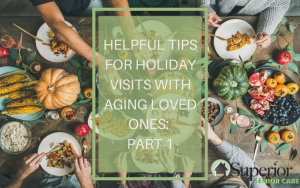
This Thanksgiving could be the first time many family members will be interacting with elderly family members after the past two years we have all experienced. It’s very common that elderly loved ones may have had a decline in their physical or mental abilities in that time period. The family members who see them on a daily basis will know that their behavior is normal and most likely they will have been working with caregivers to help the elderly family member with their daily tasks and care.
Seeing your grandmother or father in a declined mental or physical state can be scary to some and can cause some family members to react in unexpected ways; some people may become angry or distant, some may treat the elderly family member differently or poorly, and some may attempt to make unnecessary or unwise changes to the elderly family member’s care.
However, if you wish to avoid these awkward interactions, communication is key. Giving your entire family a heads up before the holidays about the condition your elderly loved one is in can minimize unwanted behavior, criticisms, or comments.
Somethings to share:
- Weight loss or gain
- Being in a wheelchair or relying heavily on a walker
- dealing with incontinence, wearing disposable briefs
- Inability to do things for themselves, like eat or use the restroom
- Unpredictable behavior or memory and cognitive problems caused by Alzheimer’s or dementia
If your aging relative doesn’t have a caregiver or a family member who sees them on a daily basis; Read Part 2 for some questions to ask to see if they might need some extra help.

1 Comment
Add Comment